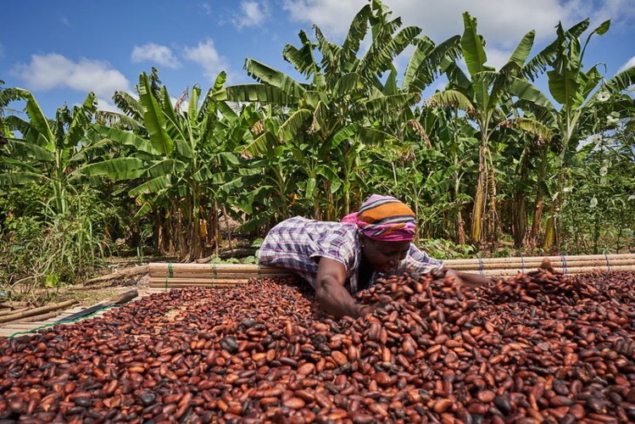The Delegation of the European Union to Ghana, Ministry of Lands and Natural Resources and the COCOBOD have hosted the second multi-stakeholder roundtable on Sustainable Cocoa in Accra
The environmental sustainability of cocoa production is at the heart of the second online roundtable discussion organised in the framework of the National Dialogue on Sustainable Cocoa.
A joint statement from the parties said the National Dialogue on Sustainable Cocoa in Ghana was launched in March 2021 by the EU and COCOBOD.
EU Ambassador to Ghana, Madam Diana Acconcia said, "The EU is committed to tackling the problem of global deforestation and forest degradation.
She said together as partners, "we can tackle climate change and biodiversity loss while ensuring socio-economic transformation."
"Transparent traceability system is essential to guarantee to all actors of the value chain that Ghanaian cocoa is environmentally sustainable,” she added.
Chief Executive Officer at COCOCBOD, Mr Joseph Boahen Aidoo said “COCOBOD, in partnership with the Forestry Commission, is currently working on a digital Cocoa Management System".
He said this system woild map all cocoa farms, collect data on the profile of cocoa farmers, and ensure that Ghanaian cocoa can be traced from the farm to the fork.
Chief Executive Officer at the Forestry Commission, Mr. John Allotey said a “Transparent and inclusive traceability systems will facilitate the monitoring of cocoa production and its potential impact on deforestation and forest degradation."
He said such systems would establish a climate of trust among all stakeholders in the value chain, as "we have learnt in the set-up of the Forest Law Enforcement, Governance and Trade - Voluntary Partnership Agreement and REDD+ Governance Structures.”
The first two online events attracted more than 150 participants each, confirming the high interest around sustainability matters in Ghana.
The second roundtable focuses on how traceability and transparency can be further improved to support a cocoa supply chain that can prove to be deforestation free.
Representatives of a large spectrum of stakeholders involved in the cocoa sector - government officials, civil society organisations, farmers’ organisations, private sector representatives and development partners shared their experiences and lessons learnt around traceability as a mechanism to monitor and prevent deforestation.
Recommendations from these discussions feed a broader dialogue launched last year by the European Commission together with global cocoa lead producers Ghana and Côte d’Ivoire.
Latest Stories
-
Kwame Boafo Akuffo: Court ruling on re-collation flawed
18 minutes -
Samuel Yaw Adusei: The strategist behind NDC’s electoral security in Ashanti region
20 minutes -
I’m confident posterity will judge my performance well – Akufo-Addo
32 minutes -
Syria’s minorities seek security as country charts new future
1 hour -
Prof. Nana Aba Appiah Amfo re-appointed as Vice-Chancellor of the University of Ghana
1 hour -
German police probe market attack security and warnings
1 hour -
Grief and anger in Magdeburg after Christmas market attack
1 hour -
Baltasar Coin becomes first Ghanaian meme coin to hit DEX Screener at $100K market cap
2 hours -
EC blames re-collation of disputed results on widespread lawlessness by party supporters
2 hours -
Top 20 Ghanaian songs released in 2024
3 hours -
Beating Messi’s Inter Miami to MLS Cup feels amazing – Joseph Paintsil
3 hours -
NDC administration will reverse all ‘last-minute’ gov’t employee promotions – Asiedu Nketiah
3 hours -
Kudus sights ‘authority and kingship’ for elephant stool celebration
3 hours -
We’ll embrace cutting-edge technologies to address emerging healthcare needs – Prof. Antwi-Kusi
4 hours -
Nana Aba Anamoah, Cwesi Oteng special guests for Philip Nai and Friends’ charity event
4 hours

